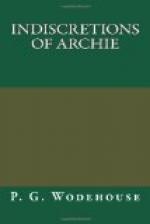“What do you want?” he demanded.
“Hallo, old thing!” said Archie. “Come and join the party!”
“Don’t call me old thing!”
“Right-o, old companion, just as you say. I say, I was just going to suggest to Mr. Connolly that we should all go up to my suite and talk this business over quietly.”
“He says he’s the manager of your new hotel,” said Mr. Connolly. “Is that right?”
“I suppose so,” said Mr. Brewster, gloomily.
“Then I’m doing you a kindness,” said Mr. Connolly, “in not letting it be built.”
Archie dabbed at his forehead with his handkerchief. The moments were flying, and it began to seem impossible to shift these two men. Mr. Connolly was as firmly settled in his chair as some primeval rock. As for Mr. Brewster, he, too, had seated himself, and was gazing at Archie with a weary repulsion. Mr. Brewster’s glance always made Archie feel as though there were soup on his shirt-front.
And suddenly from the orchestra at the other end of the room there came a familiar sound, the prelude of “Mother’s Knee.”
“So you’ve started a cabaret, Dan?” said Mr. Connolly, in a satisfied voice. “I always told you you were behind the times here!”
Mr. Brewster jumped.
“Cabaret!”
He stared unbelievingly at the white-robed figure which had just mounted the orchestra dais, and then concentrated his gaze on Archie.
Archie would not have looked at his father-in-law at this juncture if he had had a free and untrammelled choice; but Mr. Brewster’s eye drew his with something of the fascination which a snake’s has for a rabbit. Mr. Brewster’s eye was fiery and intimidating. A basilisk might have gone to him with advantage for a course of lessons. His gaze went right through Archie till the latter seemed to feel his back-hair curling crisply in the flames.
“Is this one of your fool-tricks?”
Even in this tense moment Archie found time almost unconsciously to admire his father-in-law’s penetration and intuition. He seemed to have a sort of sixth sense. No doubt this was how great fortunes were made.
“Well, as a matter of fact—to be absolutely accurate—it was like this—”
“Say, cut it out!” said Mr. Connolly. “Can the chatter! I want to listen.”
Archie was only too ready to oblige him. Conversation at the moment was the last thing he himself desired. He managed with a strong effort to disengage himself from Mr. Brewster’s eye, and turned to the orchestra dais, where Miss Spectatia Huskisson was now beginning the first verse of Wilson Hymack’s masterpiece.
Miss Huskisson, like so many of the female denizens of the Middle West, was tall and blonde and constructed on substantial lines. She was a girl whose appearance suggested the old homestead and fried pancakes and pop coming home to dinner after the morning’s ploughing. Even her bobbed hair did not altogether destroy this impression. She looked big and strong and healthy, and her lungs were obviously good. She attacked the verse of the song with something of the vigour and breadth of treatment with which in other days she had reasoned with refractory mules. Her diction was the diction of one trained to call the cattle home in the teeth of Western hurricanes. Whether you wanted to or not, you heard every word.




